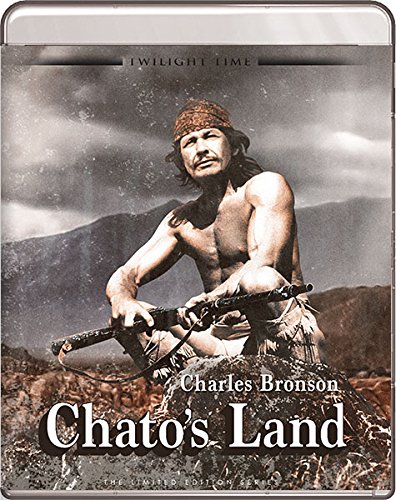
By the time 1972 rolled in, Charles Bronson was already 51-years-old and had been making moving pictures for 21 years. And yet, it wasn’t until Charles Bronson made a splash in Sergio Leone’s 1968 epic Once Upon a Time in the West that he finally became a truly “bankable” name in the US. Here, in the dusty wake of his westerns shot in Spain, Bronson finally made his “official” domestic starring role debut in a western ‒ shot in Spain ‒ which took perhaps just a tad bit of inspiration from his Italian cinema phase. Cast as a half-Apache character (shades of his early American work, such as 1954’s Drum Beat), a beautifully ripped Bronson becomes the titular terror to a group of bored, bitter, barbaric cowards who follow Chuck into barren Indian territory to kill him after he shoots a racist sheriff in self-defense.
The first collaboration between Bronson and director Michael Winner establishes the relationship we would later see at play in their more popular team efforts, The Mechanic and the first three Death Wish films (especially that whole “rape/revenge” motif). Much like a nature documentarian filming a wild animal, Winner literally places his camera on a distant Bronson, waiting for him to approach and act at his leisure. Jack Palance ‒ in the midst of his own Italian period after the disaster that was Che! came to pass ‒ delivers a fine, unsung performance as a former Confederate officer eager to hang a half-breed (digging out his old uniform and sabre to get that full feeling down), but who soon finds himself in a vast, uninhabitable land full of doubt whilst surrounded by an increasingly hostile posse of his own choosing.
Palance’s gang of doomed men include a cynical, drunken Richard Basehart (who is just there for the show); a mild-mannered, God-fearing James Whitmore; three brothers (Simon Oakland, Richard Jordan, and Ralph Waite ‒ the latter of whom looks like an earlier incarnation of Motörhead’s Lemmy), each with their own degree of sadistic pleasures; a couple of Scotsmen (Roddy McMillan and Paul Young); and even Victor French in one of his rare appearances without Michael Landon. Playing like an early western prototype of Die Hard and First Blood (the novel of which was released the same year as Chato’s Land), this fantastic minimalistic parallel to how truly awful mankind can be and the Vietnam War from screenwriter Gerald Wilson is still highly relevant today (so voters, take note).
Twilight Time’s new Blu-ray offering of this underrated picture from United Artists comes to us courtesy the MGM vault. A few composite shots (probably commissioned by the censors in order to not draw so much attention to a few gratuitous shots of full frontal female nudity in the film) look flatter than the rest, which is to be expected, but all in all, this is a great transfer for an even better flick. A DTS-HD MA Mono soundtrack is accompanied by an optional secondary DTS-HD MA 2.0 option featuring an isolated Jerry Fielding score. An included US theatrical trailer looks like it was inspired by the export trailers produced for spaghetti westerns. Lastly, there is a sit-down chat with screenwriter Gerald Wilson (who could easily pass himself off as latter-day John Huston), who has much to say about this criminally overlooked classic.
Julie Kirgo provides the liner notes for this, another highly recommended release from Twilight Time. The release is limited to 3,000 pressings, and is available while supplies last.